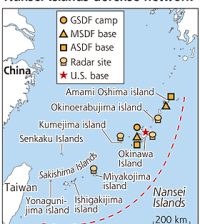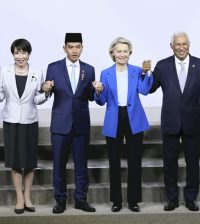- Washington “follows with interest” Morocco’s openness onto Africa (John Kerry)Posted 12 years ago
- The trial of South African Paralympic champion Oscar Pistorius opened in Pretoria on Monday.Posted 12 years ago
- USA welcomes efforts of King Mohammed VI in MaliPosted 12 years ago
- Egypt’s population reaches 94 millionPosted 12 years ago
- Mugabe celebrates his 90thPosted 12 years ago
- Moroccan Monarch to Build a Perinatal Clinic in BamakoPosted 12 years ago
- King Mohammed VI handed a donation of bovine semen for the benefit of Malian breeders.Posted 12 years ago
- Moroccan King’s strategic tour to Africa: Strengthening the will of pan African Solidarity and stimulating the south-south cooperation mechanisms over the continentPosted 13 years ago
- Senior al-Qaida leader killed in AlgeriaPosted 13 years ago
- Libya: The trial of former Prime Minister al-Baghdadi AliPosted 13 years ago
Jihadist Blockade Sparks Fuel Crisis and School Closures Across Mali
Bamako, October 27, 2025 – The West African nation of –Mali– is grappling with a severe fuel shortage after- jihadi militants imposed a blockade– on fuel imports, disrupting daily life, halting transport, and forcing the closure of schools nationwide. The unusual tactic has opened a new front in Mali’s long-running insurgency, combining economic pressure with political messaging.
Long queues stretch outside petrol stations in –Bamako–, where residents wait through the night for scarce supplies. The government has announced a –two-week suspension of classes–, saying the shortage has made it impossible for teachers and staff to reach their workplaces.
—- –A Strategic Blockade and Its Ripple Effects–
The blockade, launched in early September, marks a –new tactic– in the decade-long conflict destabilizing Mali and its Sahelian neighbors. The al-Qaida–linked –Jama’at Nusrat al-Islam wal-Muslimin (JNIM)– banned the entry of fuel from –Senegal– and –Ivory Coast–, retaliating against the junta’s earlier decision to restrict deliveries to northern regions to cut off militant supply lines.
Now, the insurgents have –turned that measure against the state–, leaving hundreds of fuel trucks stranded at border posts and sending commodity prices soaring. The disruption has paralyzed transport, agriculture, and commerce, further straining an already –fragile economy–.
A Show of Force and Political Message–
Analysts say the blockade is both –symbolic and strategic–. By choking off vital supplies, JNIM seeks to –undermine public confidence– in the junta and demonstrate its continued ability to disrupt national systems despite ongoing military counterstrikes.
According to –Beverly Ochieng– of the –Control Risks Group–, the blockade aims to “erode the junta’s legitimacy” and remind citizens that militants can still dictate the rhythm of everyday life.
Mounting Pressure on the Junta—
The –military authorities–, who seized power in 2020 promising to restore order, now face growing pressure as insecurity persists despite support from –Russian forces– and coordination with –Niger– and –Burkina Faso–.
Data from the –Armed Conflict Location & Event Data Project (ACLED)– shows a rise in deadly attacks, with several of this year’s incidents among the most severe in recent years. JNIM’s campaign appears designed to –destabilize Sahelian juntas– and expose the limits of their governance and security capacity.
Economic and Human Toll–
Despite being one of Africa’s largest gold producers, –Mali remains among the world’s poorest nations–, with nearly half of its 25 million citizens living below the poverty line. The blockade has driven up prices for fuel, food, and transport, worsening hardship for millions.
The –Malian military– has begun escorting fuel convoys from border areas while targeting JNIM positions, but limited air capabilities hamper results. “The state lacks the means to secure long supply routes,” said –Oluwole Ojewale– of the –Institute for Security Studies–.
A New Phase in the Conflict–
The fuel blockade underscores a shift toward –economic warfare – in the Sahel, where militants increasingly exploit trade and resource flows to pressure fragile states. For Mali’s junta, the crisis poses a serious test of authority; for ordinary citizens, the challenge remains immediate- finding enough fuel to keep life moving–.




